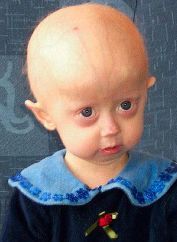Progeria is an extremely rare genetic disease that causes people to age eight times faster than normal and results in a life expectancy of about 13. However, it might also hold the key to slowing aging down and even beating cancer.
The word progeria comes from the Greek of ‘pro’ and ‘gēras’, which literally means ‘before old age’, as sufferers show many signs of aging from early childhood. It is estimated that only one in eight million people suffer from the disease and it shows no discrimination for sex or race.
 Although usually unobservable in newborns, progeria begins to cause some very distinct symptoms within the first year or two including stunted growth, full-body alopecia (that’s hair loss, including the eyebrows and eyelashes), and distinct facial characteristics such as a small face and recessed chin on a large head. More typical aging symptoms, such as arthritis, cardiovascular problems and kidney failure, tend to present themselves in later childhood. Mental and motor developments are unaffected however and although movement may be hampered by a loss of fat, muscle and an overall weakened musculoskeletal structure, children with progeria are frequently lively, friendly and happy.
Although usually unobservable in newborns, progeria begins to cause some very distinct symptoms within the first year or two including stunted growth, full-body alopecia (that’s hair loss, including the eyebrows and eyelashes), and distinct facial characteristics such as a small face and recessed chin on a large head. More typical aging symptoms, such as arthritis, cardiovascular problems and kidney failure, tend to present themselves in later childhood. Mental and motor developments are unaffected however and although movement may be hampered by a loss of fat, muscle and an overall weakened musculoskeletal structure, children with progeria are frequently lively, friendly and happy.
Progeria is caused by a random genetic mutation, which means that the disease is not inheritable or contagious. The mutated gene results in the production of an abnormal protein, called progerin. This protein limits the ability of cells to divide meaning that the sufferer’s body is less able to grow and heal, causing the signs and symptoms of progeria.
Scientists are becoming increasingly interested in progeria for several reasons. It is thought that by studying the disease many symptoms of aging may be better understood, ultimately leading to potential treatments. In addition, as progerin hampers the division of cells, it is possible that this may be a useful route to tackle cancers – the uncontrolled division of cells.
Unfortunately there is no cure for progeria and conventional treatments only work to lessen symptoms. However, current drug trials are promising leading to hope that progeria may have a meaningful treatment, if not a cure.
Two BBC documentaries following the life of Hayley Okines explain more and can be found here and here.
The featured image is from Bev Sykes and the photo of the child is from Misteli et al., both used and edited with thanks under Creative Commons Licenses.